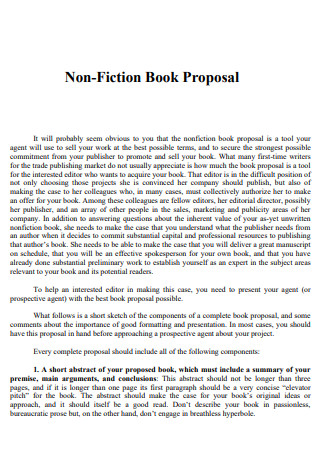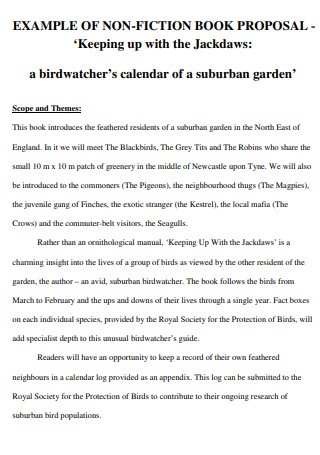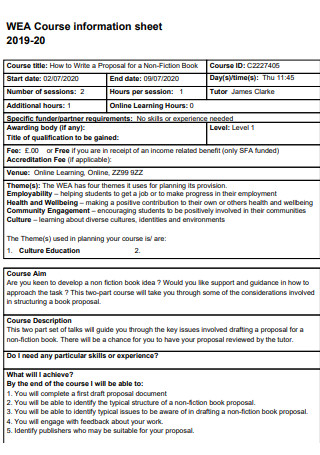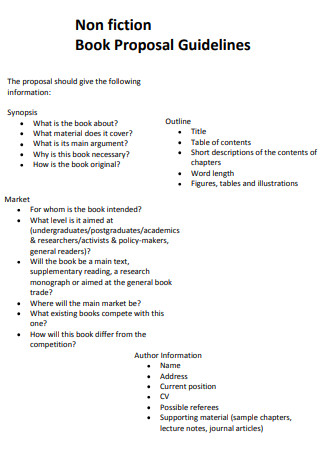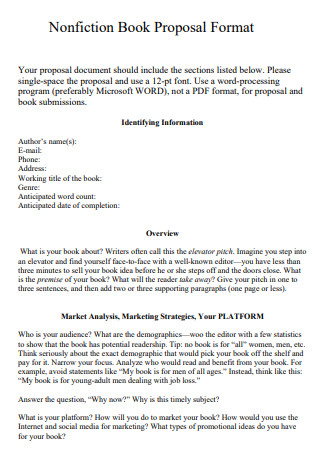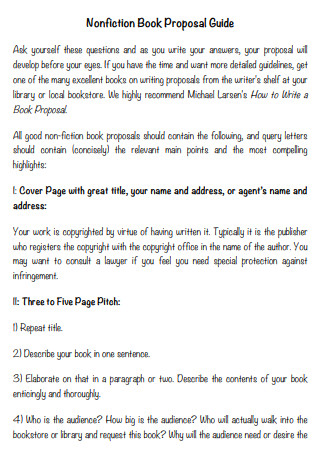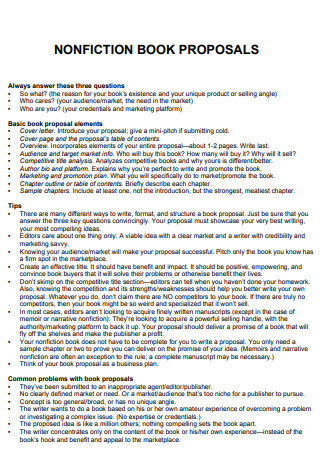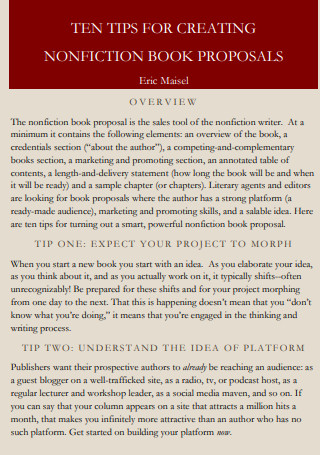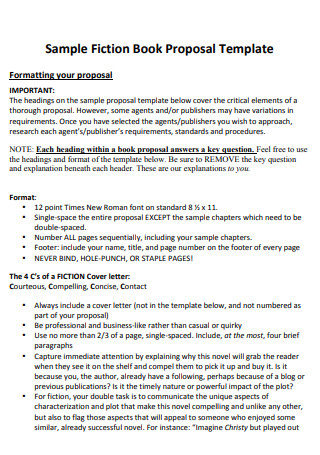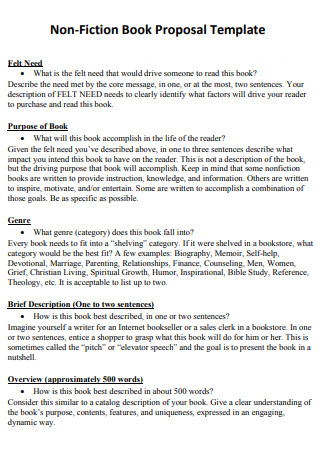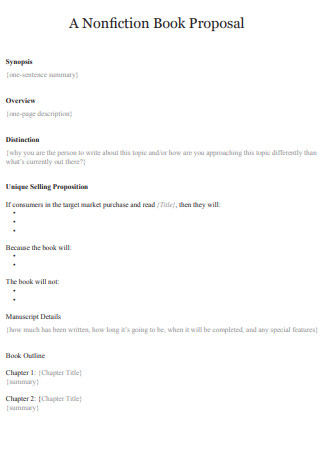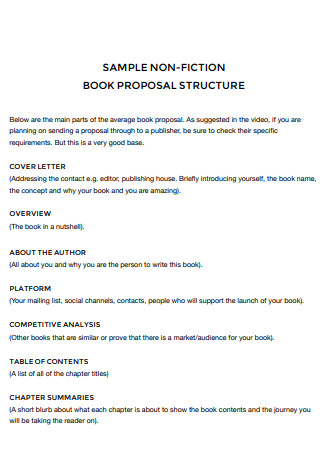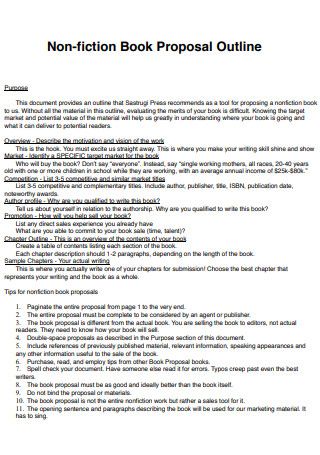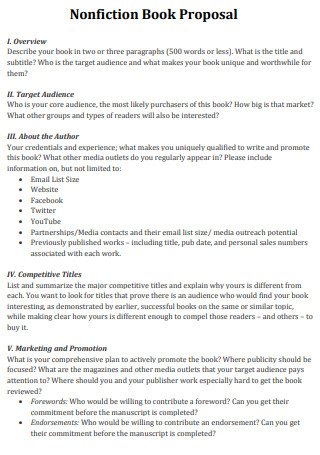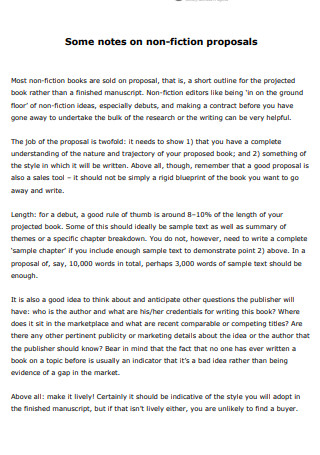14+ SAMPLE Nonfiction Book Proposal
FREE Nonfiction Book Proposal s to Download
What Is a Nonfiction Book Proposal?
A nonfiction book proposal is a printed document that aims to persuade a publisher to publish the book. Its purpose is to obtain publishing house endorsement by showing sample chapters in the document. It also provides a synopsis of the book’s content. As well as creating a marketing proposal for the promotion of the book. Nonfiction is a genre that deals with actual occurrences or records and information. Biographies and education books are just two examples. Some agents require a book proposal before they will publish a book. It is especially important for unpublished authors. Some may even require a whole manuscript in addition to the nonfiction book proposal pdf. Before signing payment contracts, a nonfiction book proposal is required. The proposal should include incorporating social media marketing or any other existing marketing plan.
Different Kinds of Nonfiction Genres
Nonfiction books are a type of documentation concerning real events and people. It is more formal than other types of literature. It is because it deals with current events or because its goal is to distribute facts. Please feel free to look at the sample book proposal pdf links provided above. But first, let’s define the types of nonfiction literature listed below.
Biography and Autobiography: Autobiographies and biographies are two of the most popular nonfiction texts adapted for movies. A biography is a book authored by someone else that details a person’s life. Autobiography, on the other hand, is a written account of a person’s life by that same person. The viewpoint may differ depending on who is writing. Biographies are usually brief and provide a timeline of a person’s life. It’s frequently done to historical figures. It establishes their history by conducting research and correlating it with known information about them. These popular figures, such as actors, scientists, or Nobel Peace Prize laureates, could be the focus of these biographies. And the more significant or well-known a person is, the more likely it is that a film will be made about them. Producers and audiences alike are drawn to real-life events. So, a hefty film budget is not out of the question. Academic Texts: Academic texts are not unfamiliar to students. It’s one of the most popular literary project papers assigned as homework. A dissertation, a book report, or an academic journal article are only a few examples of academic texts. Most academic books are created by research and experimentation to prove a theory or explain a topic. This is the type of assignments in which students learn how to prepare essay outlines and write essays. Academic literature commonly includes references to other nonfiction books as well. It has a critical and objective tone observe on it. History: History is a fascinating subject. It’s difficult to adequately represent historical events. That is simply not conceivable unless you were present at the time. Even so, there would be some presumptive inclinations. Historians, on the other hand, strive to be objective when writing history. The finest historical event paper is one that is simply factual. History is a subject that is taught in schools. As a result, it must be as accurate and neutral as possible. Because it has the potential to influence and mold a learner’s perception of what occurred. By studying evidence from previous civilizations, one may write historical books. Burial sites, ancient written texts or arts, and man-made artifacts are examples of usable evidence. Even the oldest person who ever lived was a storyteller. They scribble their truths in caves and on items. Language was never an impediment to telling the story of long-dead civilizations and bloody wars. The history of mankind is written by multiple hands and will always contain multiple truths. Manuals/Guides: Manuals and guides are simple but useful aids that humans require. Especially considering the rate at which technology is advancing. Ordinary folks require assistance in navigating and operating objects. Manuals are highly useful whether we need to make furniture or learn how to use a machine. They utilized simple terms that even a layperson could comprehend. It gives steps that gradually guide a person to the finish. Their true worth is determined by how manual, and guide gives instruction and support through texts. Journalistic Texts: Journalism has long been associated with the media. That, however, is an oversimplification. Journalism is a narrative about actual events and tales about real people. However, it also seeks to pique the interest of its viewers or readers. Journalistic texts should not exaggerate. It is a literary medium that tries to provide news. News that could be attributed to a variety of sources and individuals. It’s essentially a narrated account of events and incidents. It also aids in the distribution of live happenings through the usage of media. Journalism is a challenging and intimidating job. Because it entails journalists visiting current-event sites to gain an accurate portrayal of the narrative. Self-help Books: Self-help books seek to explain habits and actions for the one reading them. Its goal is to assist the reader in resolving inner conflicts and personal issues. So, it simply tells, through the author’s experience, how to overcome these obstacles. It also provides insight into human concerns and day-to-day problems. As a result, it intends to help the reader improve oneself through reflection based on the individual’s beliefs.
Advantages of Reading Nonfiction Books
Nonfiction books give a wealth of knowledge on a specific subject. It’s an excellent genre for testing your critical thinking and understanding. So, what are the other benefits of reading a nonfiction book? Let’s find out in the following section.
Realistic Portrayal of Events: Nonfiction, as opposed to more imaginative genres such as fantasy and sci-fi, depicts reality. A current and ongoing reality. Or a well-researched and studied history. And all of this is indicating that, yes, this has transpired or is unfolding. It’s a wake-up call, in a sense. It offers people a sense of reality. It also establishes a reasonable expectation. Fiction literature frequently led us to believe in impossible exploits or miraculous situations. However, the way nonfiction conveys truth in its clinical and objective language forces the reader to confront reality. That isn’t to suggest that fictional novels don’t hold any truths. However, fiction frequently provides an escape from reality. Creative writing allows us to draw parallels and metaphors from other realms into our own. Nonfiction, on the other hand, provides us with the truth based on facts. Enhances Critical Thinking: All books necessitate critical analysis. It’s almost as though it’s a significant contribution to the development of the psyche. However, when presented with realistic occurrences, one’s logic must likewise be reasonable. As a result, your thought pattern must continuously confront known information. Thus, rather than being speculative, your arguments must be pragmatic. The difference between fiction and nonfiction is that fiction confronts your inner self while looking from the outside. Nonfiction invites you to look outside of yourself based on your inner thoughts. And both necessitate introspection and self-reflection. It’s just that nonfiction’s matter-of-fact tone encourages confrontation rather than escapism. Offers Practical Solution: When confronted with a concept that exists in real world, whether past or present, it makes one grounded. Because nonfiction has a substantial truth that cannot be avoided. In most cases, it provides undeniable facts. As a result, there is a sense of pragmatism that allows the reader to adapt it to their own situation. Because it is more than just a theory or a notion; it can be applied and implemented. There is actual evidence to back it up. So, the notion might happen to you because it has already happened. it considers the author’s real-life experience or historical accounts. Nonfiction discusses things in a highly rational manner. The viability and proof are available for you to use as a foundation and guide. Offers an Insight on Any Subject: When a class takes a spelling test, the student who perused a dictionary is likely to get the highest mark. Reading nonfiction, likewise, teaches you new things you can use to your advantage. And there is only an upside to this. Why? Because it is your interpretation of given facts that determines whether something is negative or positive. Nonfiction is an excellent way to get started on any subject. It’s straightforward and realistic. And it’s not presumptuous most of the time. That is how it provides insight into any subject. It enables you to learn about new topics without presuming prior understanding. Unlike fiction, which already has an expectation from its readers. Fiction provides many perspectives while allowing for personal interpretation. Nonfiction provides an insight that is simply factual. It leaves no room for personal interpretation. However, it allows for different uses of any information. It also makes real-life concepts much easier to grasp. Opens Room for Discussion and Debates: Any written writings, whether nonfiction or fiction, are open to debate. The only distinction is that fiction is more hypothetical than practical. Nonfiction, on the other hand, allows for a collision of great minds that possess knowledge about the real world. It’s also an excellent venue for heated disputes between opposing viewpoints. Our thoughts are as distinct as our fingerprints and DNA. Yes, we can be influenced, but we also have personal biases. Especially in relation to historical texts. Or, to put it another way, the works of bygone painters and poets. We can only discuss what we know about them since we have so little information concerning them. As a result, the only way to win an argument is to present facts. Facts contained within a nonfictional book. So, it’s easy to debate when you know your sources are reliable and verifiable.
Steps on How to Write a Nonfiction Book Proposal
Book Reviews and best-seller lists are two indicators of a book’s performance and achievement. That is how an author may truly build a reputation for themselves. However, before you can get there, you must first learn how to write a nonfiction book proposal. Or find out the formatting of a nonfiction book proposal. No worries, just follow the steps below.
-
Step 1: Brief Book Description
First and foremost, a complete manuscript is essential before presenting a proposal. This is the most integral piece for an unpublished author. So, the first component of your book proposal is a brief description of your work, as well as the title. It should provide the agent with a specific idea. This is the section that piques an agent’s interest. You must provide a persuasive explanation.
-
Step 2: Author Information
As an author, you must also include some background information about yourself. Information that is basic but necessary. As well as any platform where you have already managed to build yourself. It is significant because a person’s background can have an impact on the book they are writing. Particularly in nonfiction. A professional certainly has an advantage over others. For their credibility has been established and proven. A summary of your background might be beneficial to your case.
-
Step 3: Marketing
An author is also a literary artist. Thus, you must develop your own Artist Marketing Plan Too. It is concerned with the feasibility and effectiveness of any marketing techniques to be applied. An author who already has their own platform has an advantage. Since it is a terrific place to advertise. Marketing aids in ensuring revenue as well as gaining new readers. It is also critical that publishing houses understand the value in releasing your book. While you can work with publishers on advertising, you must still create your own marketing strategy. It is also critical to identify your market target.
-
Step 4: Sample Chapter
Typically, sample chapters are the first few chapters of a book. It provides the agency with insight into your writing style. A sample chapter also demonstrates your aptitude and knowledge on the subject matter of the book. Nonfiction is based on facts. And the book necessitates a substantial quantity of research. Which you will be able to demonstrate based on the sample chapter you will supply. It should also display your expertise of the subject.
FAQS
What Is the Difference Between Fiction and Nonfiction?
The difference between fiction and nonfiction is determined by how realistic the books’ contents are. Nonfiction literatures are based on true events and people. Fictions are often an unique and imaginative take on a relevant problem. Fictions are also based on metaphorical and hypothetical scenarios rather than actual events. There is still a sense of reality in fiction, even if the conditions seem unlikely in real life. Nonfiction, on the other hand, gives a description of genuine occurrences as well as practical application.
Why is Reading Nonfictional Books Important?
Reading nonfiction books provides a more realistic perspective on topics. As a result, it compels people to acknowledge existing truths and their existence. In certain ways, it assists a person in being aware about historical events as well as current information. It enlightens a person on a concept to which they can easily relate based on true experience from authors or prominent figures. It also keeps a person grounded and set realistic expectations.
Is Nonfiction a Popular Genre?
Nonfiction isn’t just a popular genre, but it is the most accessible book for anyone to own. It dominates the public library’s contents. And it’s a subject that is taught in schools. As a result, determining if it is popular is more difficult than determining whether it is the most read and sold book in the world. This is because most texts required in school are nonfiction.
Books provide a plethora of information and opportunities to learn. Nonfiction is only one genre that can help us reflect on our thoughts while also teaching us something new. So, if you want to propose a new book, why not use our nonfiction book proposal sample pdf and nonfiction book proposal example? Just download them from the links above!
